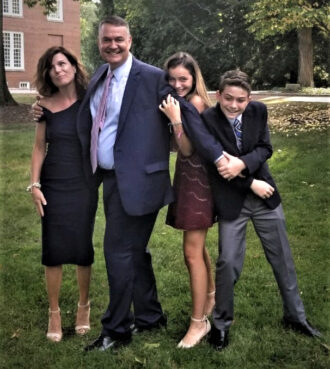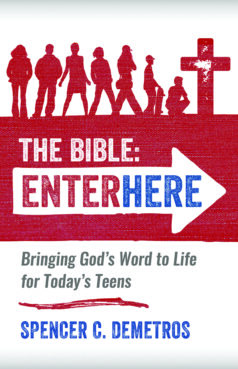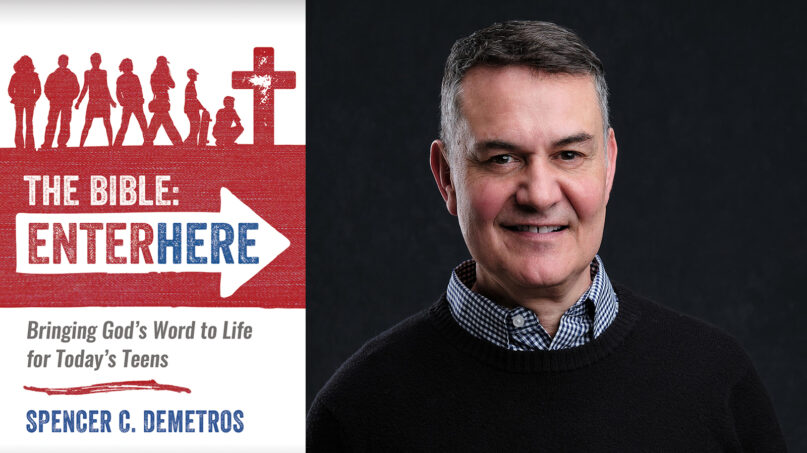(RNS) — Spencer Demetros loved reading children’s Bibles to his kids when they were young. But when they outgrew the kid’s versions, the lawyer from Harvard, Massachusetts, had a hard time finding teen-appropriate replacements. That’s when he decided to tell the old, old story in a new way.
In 2017, he began writing concise, humor-filled adaptations of Bible stories for his kids, starting with Adam and Eve — or, as the chapter is called in his book, “That Better Have Been One Darn Tasty Apple!” Three years later, he had a book: “The Bible: Enter Here.”
Data show that young people are increasingly likely to sever ties with the church. In sharp contrast with the 76% of baby boomers and 67% of Generation Xers who identify as Christians, only 49% of American millennials identify as Christians today, with 40% identifying with no religion, according to data published in 2019 from the Pew Research Center. The Barna Group also published a study in 2019 that found 64% of 18- to 29-year-olds in the U.S. had left the church after being active as a child or teen.
RELATED: If faith leaders want to reach Gen Z, meet them in the streets
Other recent research shows that children whose parents discuss faith and Scripture with them have the greatest likelihood of retaining that faith.
Religion News Service spoke with Demetros about his new book and his hopes for providing an accessible tool for reversing the trend. This interview has been edited for length and clarity.
You’ve said that this is a book, not a teen Bible. Why is that distinction important?
There’s a lot of really great teen Bibles out there that provide good commentary. But my book doesn’t transcribe the Bible and isn’t designed to replace it. It retells the key stories and teachings of the Bible as an entryway to access the Bible. I use a bunch of different techniques, including interjecting dialogue and writing some of the chapters as Peter’s diaries, and they bring the stories and lessons to life so that they’re memorable.
How does your vocation as a lawyer influence the way you went about writing this book?

Catherine and Spencer Demetros with their children. Courtesy photo
As a lawyer I have to take a wide body of complicated facts and make them crystal clear. I think God called me to do this, largely because of my legal training, and also, my personality. I don’t have the voice of a pastor or minister, it’s a little more rough-and-tumble. I’m not a very pious person, and I think coming at it from a different perspective resonates well with young people.
How did you think about bias while writing this book? Did you try to avoid imposing your own interpretations onto biblical stories?
For the most part, I tell the story, and then try to tell what the lesson is. As far as the story goes, I try to avoid any interpretation at all. I try to make it clear, relevant and entertaining, and if I can make them funny, I always try to make them funny. My goal was to not interject my view. But you can’t completely divorce your own view of the world when you’re trying to present a message, so I’m sure there are probably things about my background that come through.
You have fun with the chapter titles. Do you have a favorite?
I love my chapter title for Sodom and Gomorrah: “Why is Mom Being So Salty?” The idea of this lady being turned into a pillar of salt is so upsetting, but the title just cracks me up every time.
Women are missing somewhat from your book — there’s no mention of Esther, Deborah, Hannah, Jezebel or the Samaritan woman, and while women like Rahab, Ruth or Bathsheba are mentioned, their stories are condensed. Was this an intentional choice?

“The Bible: Enter Here” by Spencer Demetros. Courtesy image
I haven’t thought about it so it certainly wasn’t intentional. I did my best to reflect what’s in the Bible and just tell the stories as a condensed version of what’s in it. In the selection of the stories, I was just going on my experience with which are the most told or generally perceived to be the most important stories. I feel as though some of the stories hold women up in the highest regard. The story of Ruth, for example, or in one of Peter’s diaries, I included the story of the Syrophoenician woman. Peter perceived her as a woman of great strength.
Was there a story you particularly enjoyed writing?
The chapters that were the funniest were the ones that just wrote themselves. The dialogue between Abraham and Sarai, and the dialogue between Jesus and Zacchaeus or Jesus and the devil in the desert. The harder ones were more about pain and human suffering. The Book of Job was really challenging to write. It wasn’t just because it was such an unfortunate circumstance. There was a lot of lyrical text that made it difficult from a story perspective.
The Bible contains some pretty difficult content, from gang rape to prostitution and genocide. How did you approach these more challenging topics and events?
I tried to be mindful of the audience. I really tried to keep it very clean. Not that those things aren’t important, and I think in a Bible study, it’s absolutely appropriate to discuss. But for this, I really wanted it PG-13.
RELATED: Gen Z is keeping the faith. Just don’t expect to see them at worship.
Are you concerned that sanitizing some stories may cause teens to feel misled or disillusioned when they eventually read the stories in their original context?
There are a lot of details in the actual Bible I didn’t put in because I wanted the stories to be concise. That’s part of the reason why I make a very strong recommendation that folks don’t consider this book a substitute for the Bible, but that they actually read the Bible to drill down on the details.
Why might this book be especially needed right now?
It fits a need that has been there for quite some time: telling the Bible in a way that’s entertaining and accessible. Part of being human is living in a world where we all have challenges, we all suffer, we all have frustrations. But things today are especially tough on young people. And coming out of COVID, everyone is war-torn and weary. People are looking for hope. I believe that the true source of hope and joy is God, and Jesus’ message. We have to get back to that. Our old ways of getting kids to church isn’t working, so we have to do things differently. This book is one tool to head in that direction.
What’s one takeaway you hope teens will have after reading this book?
You can be quirky, funny and a little edgy and still be a good Christian.





